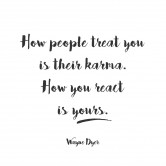How to Deal With People Who Push Food On You

Or, on the flip side, if you went for seconds or a piece of apple pie, people would continue on with their own lives and not feel a need to comment on what you’re doing. Imagine that!
*sigh*
But that just isn’t what happens in real life.
I don’t get why people aren’t more supportive of your healthy lifestyle changes. And don’t get me wrong, I’m not against people overindulging. Sometimes it can even be a good thing. I’m also not somebody who preaches “all or nothing.”
But I know what it’s like around holidays or celebrations, and people push, push, push and push for you to eat and drink.
How does what YOU eat affect THEIR life? It doesn’t. It shouldn’t.
It sometimes feels like they’re a drug pusher. They tempt you; they cajole; they bring in the guilt tactics or they shame you.
But for what purpose? What do they get out of it? You want me to eat unhealthy foods…. to make you feel better? What the heck! It makes no sense!
And while it might sound like fun to hit back with a snappy comeback -- “What are you? The food police?” -- it’s usually better not to deal with negativity with even more negativity.
Here are some reasons why people push food on you:
They Think You’re Not Having Fun
They tell you to let loose. They make you feel like you’re not having fun if you’re not eating and drinking like they are.But there are lots of other ways to celebrate without food or drink. You’re not there to eat; you’re there to celebrate with family and friends.
Catch up with people you haven’t seen in a while. Talk about what you’ve been up to.
They Think You’re Being Polite
Could be your pusher thinks you’re just saying no to be polite.I don’t know about you, but I was brought up not to accept things when offered. It was the ‘polite’ thing to do.
Which is weird when you really think about it.
I know that when I offer somebody something (a cup of coffee, a glass of water, a spot of lunch), I am sincere in my offer. They’re free to say yes or no. Either way, to me, the decision is theirs.
It’s okay to be firm. Thanks, but no thanks. They should understand after the third “no, thanks” that you’re being sincere.
(As a side story, years ago, I had an jerk of a boss criticize me because I decided to step out of my comfort zone and take up somebody’s offer of “Hey, would you like a piece of this?” He actually hauled me into his office and told me I should have said no!)
Another Way to Look at It
If you’re still having a bit of trouble, one way to look at saying “no” is that you’re being a healthy influence on others.Your pusher is not just pushing on you. S/he is likely pushing on everybody else, too.
I’m willing to bet you’re not the only person in the room who wants to say “thanks, but no thanks”.
You may not realize it but you can help influence others around you in a positive way.
And every time you say “thanks, but no thanks”, you’re practicing and strengthening your own habits of healthy eating. Every time you stick to habits that move you forward, it reinforces those healthy habits.
Every. Single. Time. So, keep practicing!
See: Master These Two Simple Habits To Lose Weight
On the flip side, there’s how YOU might be feeling when somebody pushed food on you.
You Don’t Want to Be Rude or Disappoint Somebody
I get it. You know the person worked hard on the food they prepared. They worked hard to set up a festive atmosphere.But the bottom line is: you’re not responsible for anybody else’s happiness. You really aren’t. They made that decision to serve the food they’re serving.
And let’s look at it another way: if you had severe food allergies, a disease or religious beliefs preventing you from eating certain foods, your host wouldn’t be upset, right?. It should be the same for somebody who doesn’t want to eat certain foods.
Again, why should what *you* eat affect anybody else in any way. It shouldn’t!
They’re responsible for their own happiness. You shouldn’t have to sacrifice your health to make somebody else happy. When you think about it like that, it doesn’t really make sense, right?
See: Top 10 Habits for a Healthy New Year
You Really Do Want to Eat the Food
This is where I’m probably different from other weight loss coaches: If you want to eat the food being offered, eat the food!There, I said it!
I am not the kind of weight loss coach who tells you what you should and shouldn’t be eating. What I am about is helping you make your own conscious, informed decisions. What you eat is up to you.
But don’t eat it and then tell yourself you’re weak afterwards.
Don’t eat it and tell yourself you have no will power.
No beating yourself up about it.
And no thinking you’ve just ruined everything so you may as well ditch all your healthy habits forever.
Eat it. Enjoy it. And then move on.
My trick for overindulging is I’ll only eat THE best foods. If the food isn’t at a “HECK YEAH” level, I’ll usually say no.
See: What To Do After Overindulging
And if you decide NOT to eat the food. Same thing. You made a conscious decision. Move on. Have fun. Don’t pine for the food.
Little White Lies
While I’m all for honesty and transparency, there’s nothing with little white lies if you’re not yet ready to push back at the pushers.I already ate.
My stomach’s a bit upset right now. (This one works very well if you do a stage-whisper. Makes them think you’re having “issues” one wouldn’t discuss in front of company.)
I have trouble digesting that.
I’m full/stuffed.
One little white lie I would NOT use is something like “I’m allergic to that.” That could send your host/hostess into a frenzy of finding you something that you can eat and/or tossing out food that contains your supposed allergent.
And saying things like “I’m vegetarian/gluten-free/dairy-free/keto” etc. when it’s not true and when you’re trying ease pressure on yourself won’t work. That will likely open up a whole other can of worms, with even more pressure!
See: Do Food Intolerances Affect Your Weight Loss?
Is It Time for A Crucial Conversation?
What if the problem has been growing and getting out of hand? You might decide, at a certain point, that enough is enough -- and that it’s time to have a crucial conversation with people who are undermining your weight loss and healthy eating efforts.A family gathering might not be the right time to do this. Or maybe it is. That’s totally up to you.
But if it’s getting to you and you truly care about the person, sitting down with your pusher/saboteur and asking them, in a sincere way, why they’re pushing food on you, can help you to understand where they’re coming from.
A sincere and authentic, “How does what I eat affect you right now? Why is it that you want me to eat something I don’t want to eat?” can open up a meaningful conversation and help both of you to understand each other.
A Few Extra Tips
- Bring foods along that fit your healthy lifestyle.
- When it comes to alcoholic drinks, have a glass of sparkling water with a piece of lime or lemon on hand. People will be less likely to offer you an alcoholic drink.
- Move to another room in the house, if possible.
The best way to strengthen your “thanks, but no thanks” muscle is to create healthy nutritional habits.
Over time, as healthy eating becomes a solid habit, it gets easier and easier to say no to people who want to push food on you. As a nutrition coach, I can help you become somebody who stands firm in their choices -- because they are *your* choices.
At the end of the day, your nutritional decisions -- how much, what, why and when you eat -- are completely up to you. It’s not up to anybody else. Stand firm in your decisions for your own sake.
